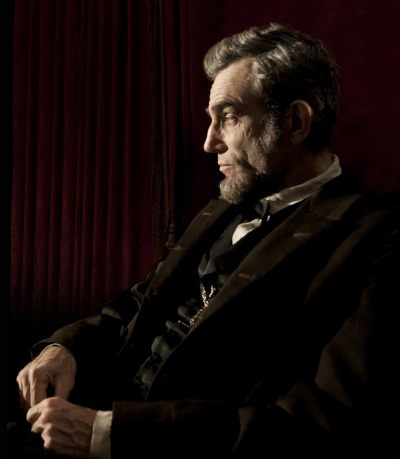Obama, Lincoln And The Misuses Of History
By Steven Pate in Arts & Entertainment on Nov 19, 2012 8:20PM

Daniel Day-Lewis as Abraham Lincoln
It is perhaps even less surprising that before last night's screening, many pundits and critics yielded to the temptation to see the movie as a neat historical antecedent for the contours our contemporary political conflicts. Spielberg's Lincoln portrays that President's determination to ensure the fractious House of Representatives passes the 13th amendment abolishing slavery during the waning days of the Civil War. Fresh from re-election to a second term, Lincoln must use whatever means necessary to secure a majority, from arm twisting to legislative horse trading, before the window of opportunity closes. Coming on the heels of an election in which the country was as divided figuratively now as it was literally in 1865—with "us versus them" rhetoric at a fever pitch—facile comparisons are to be expected. They should be resisted.
Take Dan Froomkin, who wrote "the movie finds Lincoln precisely at the same moment Obama finds himself now: newly reelected and stymied in his goals by a critical mass of irascible House members on the wrong side of history." Or Marshall Fine, who hopes that "Barack Obama will not only see it but take it as a template for the current lame-duck session of Congress and for his impending second term." Call this the creeping Sorkinizing of history: events are presented in a way that makes for the most rousing pep rally fodder to flatter the side that's doing the framing. Doing this risks turning the movie into partisan fare that conservatives will be prejudiced against and also cherry-picking the attractive parts of the story while ignoring history's more bitter lessons.
We enjoyed Lincoln and think you should see it. The film does an awful lot of things very well, Daniel Day-Lewis is amazing and there are too many great actors in the ensemble to enumerate here. However, to argue that you should see it because this moment in history is anything like that moment, to suggest that anything on the current legislative agenda can approximate the moral weight of ending the most heinous institution ever to stain this country's conscience since the framers kicked the can down the road in Philadelphia, or to imply that accomplishing this necessary feat did not cost more than 600,000 lives up front and decades of bloody strife (the ramifications of which we are still living with today) on the back end, is to evacuate a very interesting historical portrait of everything that makes it worthwhile.
The passage of the 13th Amendment was not a magic bullet. It was followed by an Presidential assassination, two more constitutional amendments, an impeached President, an utterly catastrophic period of Reconstruction, and then an era in which the Southern states were allowed to disenfranchise those newly-freed slaves through voting requirements and enshrine segregation via Jim Crow. A view that the United States government was no longer a voluntary enterprise, but an imposition of "them" upon "us" metastasized very quickly. Today we still wrestle with the fallout: just last week, audio of Lee Atwater's bald characterization of the "Southern Strategy" testifies to how it has been exploited. Mitt Romney chalking up his loss to "gifts" bestowed on favored classes by Democrats is the modern equivalent of 19th century characterizations of the Freedman's Bureau. We're even having to hear absurd demands for secession again.
Abraham Lincoln is always at the top of the list when we rank presidents, no matter which side of the political aisle we sit. In large part, this is because he was a leader who insisted on taking the widest view of who gets to call themselves an American. To the mortification of the South, this included the slaves. To the chagrin of many Republicans, this included the Rebels. What is the lesson we want to take away from the story of the passage of the 13th Amendment? That when the country is at its most divided is when to act decisively and pragmatically to achieve your agenda while you can? We would say that despite its magnificent depiction of Lincoln the man, the protagonist of Lincoln the movie is the democratic process. The 13th Amendment didn't free the slaves and neither did Abraham Lincoln. We did it, through the exercise of our own powers. If we suggest that Obama emulate Lincoln, let us insist that it be in showing us through leadership a larger sense of ourselves.